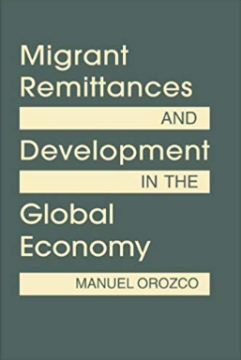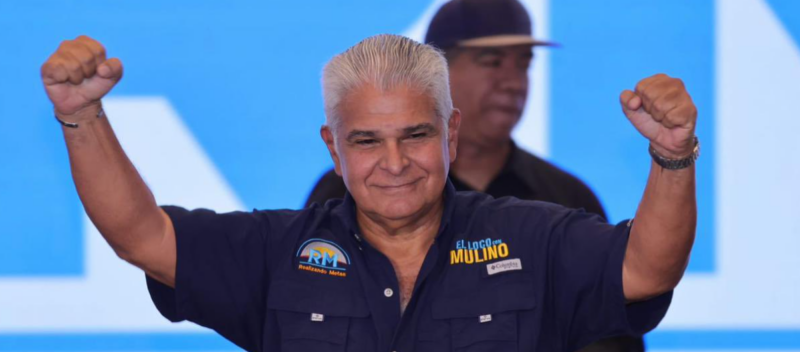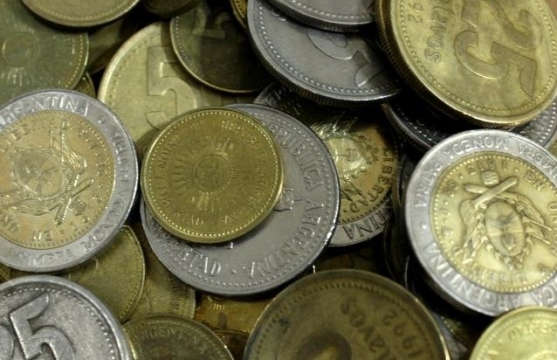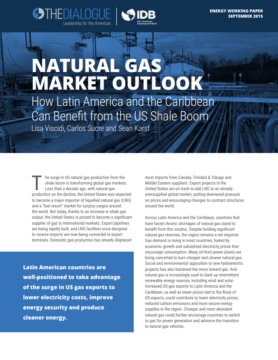
Migrant Remittances & Development in the Global Economy
How do patterns of migration and remittances differ across regions? What kinds of frameworks support the contributions of remittances to local development?
A Daily Publication of The Dialogue
José Raúl Mulino, a former government minister and businessman, was elected Panama’s new president on Sunday, winning 34 percent of the vote and defeating his nearest rival by nine percentage points. Mulino, whom former President Ricardo Martinelli had tapped as his running mate, replaced Martinelli on the ballot after the former president was ruled ineligible following his sentencing to 10 years in prison for money laundering. What fueled Mulino’s victory in the election? What can Panamanians expect of his government, and what are the main challenges that he will face when he takes office in July? How well will Mulino be able to work with the newly elected National Assembly? To what extent will Martinelli drive the actions of Mulino’s government?
Sabrina Bacal, anchor and former news director at TVN Media Panamá: “José Raúl Mulino’s victory is the result of a very effective electoral strategy, which achieved the unexpected: transferring all of former President Ricardo Martinelli’s political capital to him. In this way, the Martinelli-Mulino duo promised that Panama would return to the ‘economic bonanza’ of the president’s term. The dispersion of the vote among the other three important candidates and the existence of a single electoral round completed Mulino’s victory. In his first speech as president-elect, Mulino assured that he is ‘nobody’s puppet.’ He also spoke of his victory as a ‘mission accomplished’ for Martinelli, his friend who had taken refuge in the Nicaraguan embassy, and he attacked those who he considers guilty of what he calls political persecution against Martinelli: justice authorities and the media. With these mixed signals, it is difficult to guess how much influence the former president will have on the new government. However, it is clear that Mulino owes the presidency to Martinelli, and it is naive to think that he will not repay him by helping him with his legal situation. Mulino will have to face a difficult economic situation that is far from the prosperity he promised. The new National Assembly has an important bloc of independent deputies who could be Mulino’s main opposition, along with figures like Ricardo Lombana, who finished second in the presidential race. Mulino’s authoritarian leadership style could prove explosive in a society that showed at the end of 2023 that it is willing to protest massively against impositions such as mining contracts.”
Joaquín Jácome Diez, senior partner at Jácome & Jácome in Panama City and former trade minister of Panama: “The main driving force behind Mulino’s victory was Ricardo Martinelli’s endorsement. However, Mulino also rallied support from a segment of Panamanian society that would have never endorsed Martinelli due to his success in the public and private sectors. In his first address as president-elect, Mulino stated his intention to form a coalition government consisting of the brightest minds in the nation. Mulino also emphasized his respect for human rights and freedom of speech, asking the media owners for the respect the presidential office deserves. Further, he guaranteed law and order to all Panamanians—something the public has been yearning for. Panama’s main challenges on the international front are regional issues such as narcotics trafficking and illegal migration. Additionally, Mulino’s government must foster a strong relationship with the United States, built on a solid foundation of issues of shared importance (China, for example) and not depend on the status of Ricardo Martinelli. On the home front, Mulino must fight the growing inequality by collaborating with the private sector to stimulate employment and attract foreign direct investment. Other priorities are advancing pension reforms and deciding how to address the ongoing mining standstill with First Quantum. The diversity of the newly elected National Assembly, which is heavily populated by independents, allows Mulino’s administration to look for consensus on different matters, as he mentioned in his victory speech. In that speech, Mulino reiterated that he was elected by the popular vote to serve all Panamanians and would not be anybody’s puppet.”
Orlando J. Pérez, professor of political science at the University of North Texas at Dallas: “José Raúl Mulino’s victory was fueled primarily by nostalgia for a return to the economic boom under the Martinelli presidency (2009-2014). Mulino ran an anodyne campaign that embraced the former president and promised more money in citizens’ pockets and massive infrastructure projects. Mulino’s victory is partly due to Panama’s electoral system, which awards the presidency in a single round with a plurality. Paradoxically, Mulino and Martinelli used popular discontent, and Panamanians’ natural cynicism over politics, to portray themselves as politically persecuted ‘outsiders.’ The constitutional challenge to Mulino’s candidacy and the delayed Supreme Court decision worked in his favor. Mulino faces significant economic challenges, including mounting debt, a collapsing social security system, an ongoing cost-of-living crisis, slowing economic growth and declining foreign investments from the closing of a copper mine. He has promised a business-friendly administration. Mulino has historical ties with the business community but finding the resources to expand public sector expenditures will be difficult. Additionally, the National Assembly will be the most fragmented since 1994 and dominated by opposition deputies, most of whom are unaffiliated with political parties. Building legislative majorities will be a challenge. Finally, Mulino will need to deal with Martinelli. Mulino’s supporters, particularly in the business community, expect him to be his own man. There are precedents across Latin America of protégé candidates challenging their patrons once in office. Mulino indicated in his victory speech that he was not a puppet. However, many who voted for him did so because of Martinelli. A rift with the former president might extract a political cost.”
John Feeley, former U.S. ambassador to Panama: “As Panama’s famous salsa artist Rubén Blades sang, ’Life surprises you ...’ Six months ago, José Raúl Mulino was a former security minister living a quiet life as a corporate lawyer. Today, he is the president-elect of Panama. His election is due to the Donald Trump of Panama: Ricardo Martinelli. A convicted money launderer, on the run from Panamanian justice and currently in residence at the Nicaraguan embassy, ex-President Martinelli has been, and remains, Panama’s most popular and polarizing figure. Mulino won because Martinelli’s voters were loyal. Last minute electoral court and supreme court challenges aside, Panamanians are disgusted with the do-nothing PRD incumbent administration and voted to ‘make Panama great again,’ as the populist Martinelli promised to put money in the pockets of average Panamanians, even as he Instagramed his trademark ‘too much information’ messages from semi-captivity in a dubious political asylum status. By contrast, Mulino is a serious statesman who worked well with the United States to combat terrorism and organized crime. He is serious, even dour, but an able administrator. Panama’s list of pressing issues is both long and worrisome. Multiple crises concerning social security, canal operations and water management, a recent credit rating downgrade, a ballooning debt and massive migration through the Darién Gap will confront Mulino. However, the most pressing issue is will Mulino be his own man, or will he be a ventriloquist’s dummy for Ricardo Martinelli? The United States, the ratings agencies, regional governments and the highly independent, new National Assembly that Mulino does not control will all be watching carefully.”
Arantza Alonso, senior analyst for the Americas at Verisk Maplecroft: “Former Security Minister José Raúl Mulino, whom many voters saw as a proxy for former President Ricardo Martinelli, has been elected president. But a weak mandate stemming from electors’ low levels of satisfaction with the candidates on offer, plus the daunting tasks of reviving the economy and mending social divisions, will loom over his presidency. Through ambitious investment in infrastructure and a higher minimum wage, Mulino has promised to deliver a similar wave of economic prosperity to that seen under Martinelli—but the corruption scandals that marked Martinelli’s economic achievements and Mulino’s closeness to the former president will call into question his ability and willingness to tackle corruption and increase government transparency. Panamanians will expect Mulino to fight malfeasance while fixing Panama’s economic problems and restoring its reputation as an investment haven. Further cuts across social spending and other expenditures to offset large fiscal deficits—along with potential tax measures—will have to be in the cards, but at risk of a major pushback. He will also have to deliver rapidly to mitigate governability risks, as citizens have shown their willingness to take discontent to the streets. Their disenchantment with political graft in particular, and the political class in general, was reflected in the National Assembly’s electoral results, where no single party has captured the majority. This will make it harder for Mulino to garner support in the legislature and will likely push him to forgo some of his proposals, including his initiative to draft a new constitution.”
Michelle Watts, associate dean of the School of Security and Global Studies at the American Public University System: “José Raúl Mulino’s victory appears to be tied to the continued popularity of former President Ricardo Martinelli, also known as ‘El Loco’ (The Crazy One). Mulino showed his allegiance to Martinelli by ensuring that campaign literature included ‘El Loco con Mulino,’ tying him to the former president, who is associated with more prosperous times. Like Martinelli, Mulino was accused of corruption and spent six months in jail on a conviction that was later overturned (he claims this was political persecution). The appeal of such candidates may appear surprising in a country where the majority is reportedly concerned with corruption. However, it is important to bear in mind that Mulino is the choice of less than half of those who voted. He will also be faced with working with a multitude of parties in the National Assembly. Mulino promises to be mindful of those in need. However, as a former public security minister, he is known for repressing protests with a heavy hand. This may also influence his proposed policy to close the Darién Gap. Attempting to close main routes of migration could make the journey through the gap even more treacherous than it already is. Mulino has also pledged to expand infrastructure and interestingly, build a hospital for pets to be named after Martinelli’s dog. He has pledged to fight corruption, a perennial promise of Panamanian candidates. Unfortunately, his close alliance with Martinelli casts a shadow over his ability to act independently and make a real dent in corruption.”
Hugo Wood, adjunct professor at Santa María La Antigua Catholic University in Panama City: “Mulino's election confirms a tendency that has been present in Panama over the last 30 years, a constant demand for change. In that time frame, in every election, the ruling party has suffered severe losses in terms of public support, causing its downfall on election day. 2024 is no exception. The ruling party, PRD, fell short in reaching 10 percent of the vote, and other traditional mainstream parties also suffered the consequences of this sentiment. Mulino is called a ‘political dolphin,’ due to his unexpected designation as a presidential candidate after Ricardo Martinelli’s disqualification. His popularity can be understood mostly by the bonanza memories that people have of the Martinelli administration, from 2009 to 2014, when the country's GDP grew around 7 percent annually, on average. His main promise: ‘chen chen en tu bolsillo,’ (‘money in your pocket.’) This served as Mulino’s main platform to position him as the candidate who will make a difference in people’´s daily lives. His priorities are unknown, and this is troubling considering that the country faces pressing challenges around pension reform, health care, access to water and sanitation, handling the aftermath of the failed First Quantum mining contract and the expansion of the Panama Canal water reservoirs, among others. He promised a major constitutional change, but there is no clear timeline. His party was not even close to reaching the majority of seats in the National Assembly, and the main political force is composed of a group of independents whose main promise is to fight corruption and traditional political parties. It is estimated that 70 percent of the elected legislators will hold the role for the first time. This could mean tension between the two branches. A lot of expectation revolves around his cabinet appointments and other important selections, and that will send a signal about the type of administration Mulino will lead.”
 The Latin America Advisor features Q&A from leaders in politics, economics, and finance every business day. It is available to members of the Dialogue’s Corporate Program and others by subscription.
The Latin America Advisor features Q&A from leaders in politics, economics, and finance every business day. It is available to members of the Dialogue’s Corporate Program and others by subscription.
How do patterns of migration and remittances differ across regions? What kinds of frameworks support the contributions of remittances to local development?
In 2014, remittances to Latin America and the Caribbean grew 4%, reaching at least $62.3 billion.
Given their close proximity to the United States, LAC countries are well-positioned to capitalize on the surplus of US gas exports and current buyer’s market.
 José Raúl Mulino, who was former President Ricardo Martinelli’s running mate, was elected president of Panama on Sunday following Martineli’s disqualification from the race. // File Photo: @JoseRaulMulino via X.
José Raúl Mulino, who was former President Ricardo Martinelli’s running mate, was elected president of Panama on Sunday following Martineli’s disqualification from the race. // File Photo: @JoseRaulMulino via X.

